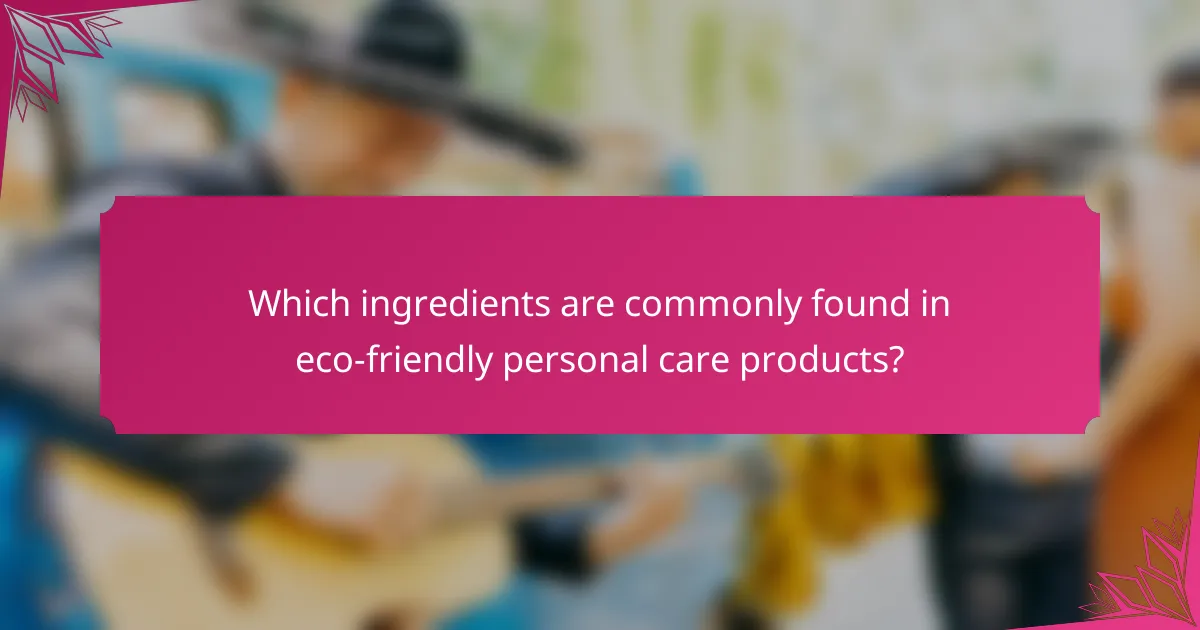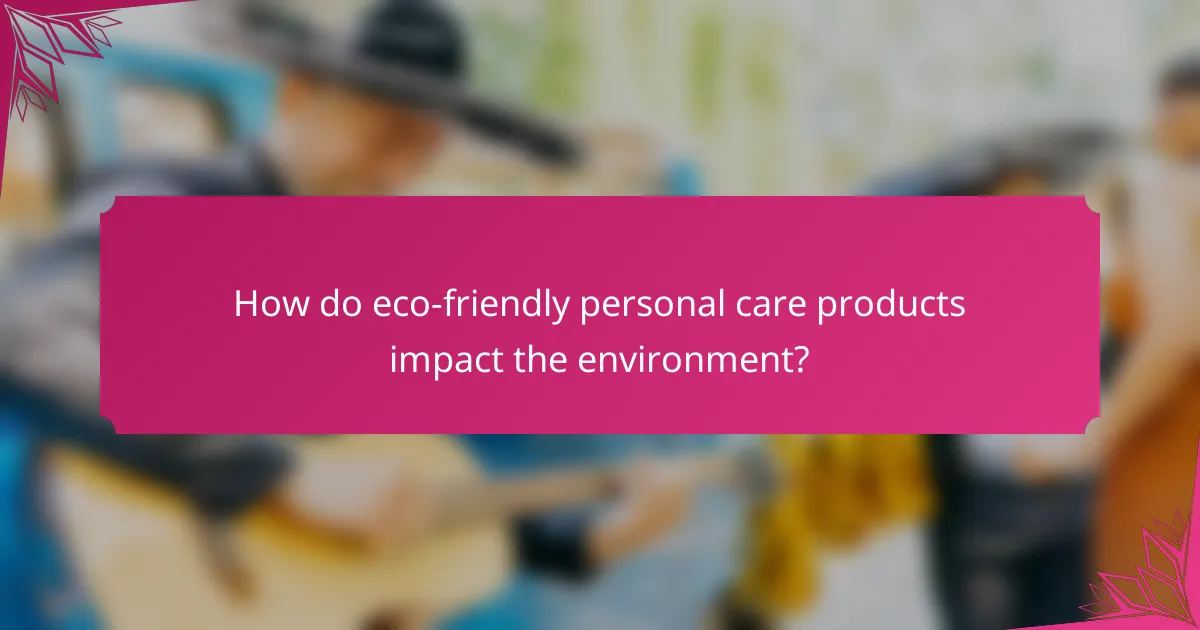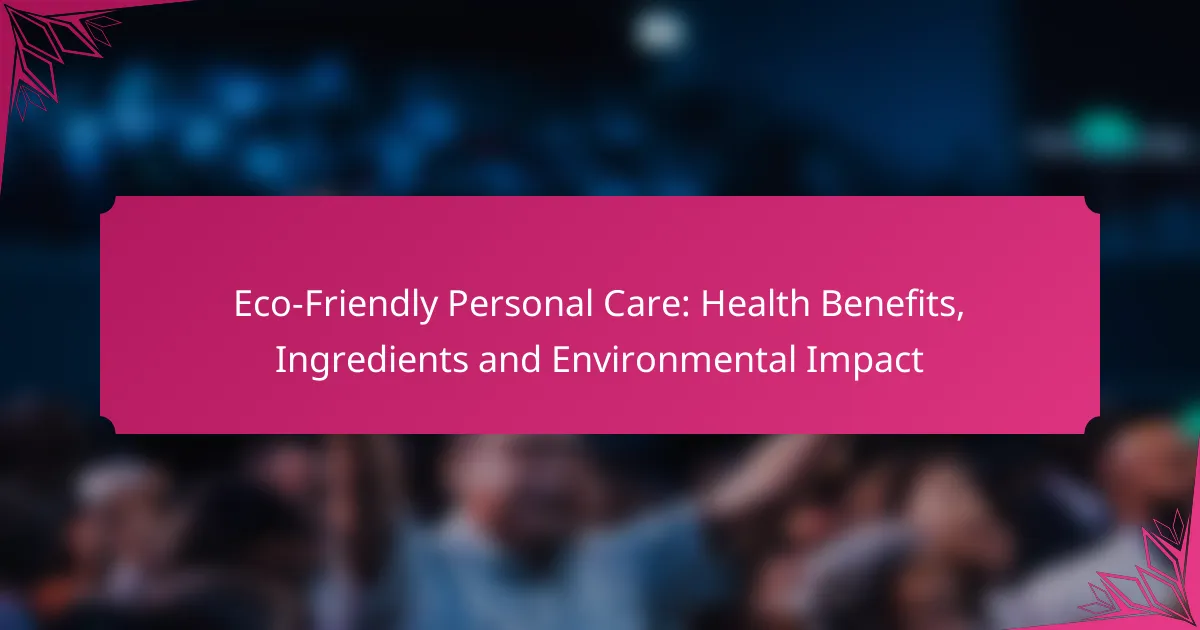Eco-friendly personal care products are designed to enhance health and well-being while being gentle on the environment. By utilizing natural ingredients and avoiding harmful chemicals, these products promote healthier skin and reduce the risk of irritation and allergic reactions. Additionally, their sustainable formulation helps minimize environmental impact, making them a responsible choice for conscious consumers.

What are the health benefits of eco-friendly personal care products?
Eco-friendly personal care products offer several health benefits, primarily due to their natural ingredients and lack of harmful chemicals. These products can lead to healthier skin, reduced irritation, and a lower likelihood of allergic reactions.
Reduced skin irritation
Eco-friendly personal care products often contain natural ingredients that are gentler on the skin compared to synthetic alternatives. For instance, products free from parabens, sulfates, and artificial fragrances can significantly decrease the chances of irritation, especially for sensitive skin types.
When selecting personal care items, look for labels that specify “hypoallergenic” or “dermatologist-tested” to ensure they are less likely to cause skin issues. Ingredients like aloe vera and chamomile are known for their soothing properties.
Lower risk of allergies
The absence of harsh chemicals in eco-friendly products reduces the risk of allergic reactions. Many conventional personal care items contain allergens that can trigger skin reactions or respiratory issues.
Choosing products with fewer synthetic additives and more organic components can help minimize exposure to potential allergens. For example, opting for fragrance-free options can be beneficial for those with sensitivities.
Improved overall skin health
Natural ingredients in eco-friendly personal care products can enhance overall skin health by providing essential nutrients and hydration. Ingredients like coconut oil and shea butter are rich in vitamins and fatty acids that nourish the skin.
Regular use of these products can lead to improved skin texture and tone. Look for products that emphasize organic and sustainably sourced ingredients to maximize benefits.
Enhanced mental well-being
Using eco-friendly personal care products can contribute to mental well-being by promoting a sense of connection to nature and sustainability. The calming scents of natural ingredients, such as lavender and eucalyptus, can also reduce stress and anxiety.
Incorporating these products into your daily routine can create a more mindful self-care experience, enhancing your overall mood and mental clarity.
Support for sustainable practices
Choosing eco-friendly personal care products supports sustainable practices that benefit the environment and public health. These products often come from companies that prioritize ethical sourcing and environmentally friendly packaging.
By selecting brands that adhere to sustainable practices, consumers can contribute to a reduction in pollution and waste. Look for certifications like “cruelty-free” or “eco-cert” to ensure your choices align with sustainable values.

Which ingredients are commonly found in eco-friendly personal care products?
Eco-friendly personal care products often include natural and sustainable ingredients that are gentle on both the skin and the environment. Commonly found ingredients include natural oils, plant-based extracts, essential oils, biodegradable surfactants, and organic preservatives.
Natural oils (e.g., coconut oil)
Natural oils, such as coconut oil, are popular in eco-friendly personal care due to their moisturizing properties and skin benefits. They can help hydrate the skin, reduce inflammation, and provide a protective barrier against environmental stressors.
When selecting products with natural oils, look for cold-pressed or organic options to ensure purity and effectiveness. Consider using coconut oil for its versatility, as it can be used for skin, hair, and even as a makeup remover.
Plant-based extracts (e.g., aloe vera)
Plant-based extracts, like aloe vera, are valued for their soothing and healing properties. Aloe vera is known for its ability to hydrate and calm irritated skin, making it a staple in many eco-friendly lotions and gels.
When choosing products with plant extracts, check for high concentrations of active ingredients to maximize benefits. Look for certifications that indicate sustainable sourcing to ensure the extract is environmentally friendly.
Essential oils (e.g., lavender)
Essential oils, such as lavender, are often included in eco-friendly personal care products for their aromatic benefits and therapeutic properties. Lavender essential oil is known for its calming effects and can help reduce stress and promote relaxation.
When using products with essential oils, be cautious of potential skin sensitivities. Always perform a patch test before full application, and opt for products that use high-quality, organic essential oils for the best results.
Biodegradable surfactants
Biodegradable surfactants are surfactants derived from natural sources that break down easily in the environment. They are used in eco-friendly cleansers and shampoos to create lather while minimizing environmental impact.
Look for products that specify biodegradable surfactants on their labels, as these are less likely to contribute to water pollution. Common biodegradable surfactants include those derived from coconut or palm oil, which are more sustainable options.
Organic preservatives
Organic preservatives are used in eco-friendly personal care products to extend shelf life while maintaining safety and efficacy. These preservatives are derived from natural sources and are less likely to cause irritation compared to synthetic alternatives.
When selecting products, look for those that use organic preservatives like rosemary extract or vitamin E. These options not only preserve the product but also offer additional skin benefits, making them a smart choice for eco-conscious consumers.

How do eco-friendly personal care products impact the environment?
Eco-friendly personal care products significantly reduce environmental harm by minimizing waste, lowering carbon emissions, conserving water, supporting ethical sourcing, and promoting biodiversity. These products are designed to be less harmful to the planet, making them a responsible choice for consumers.
Reduced plastic waste
Eco-friendly personal care products often come in biodegradable or recyclable packaging, which helps to reduce the amount of plastic waste that ends up in landfills and oceans. For instance, brands may use glass, aluminum, or compostable materials instead of traditional plastic containers.
By choosing products with minimal or sustainable packaging, consumers can contribute to a decrease in plastic pollution. Simple actions like selecting refillable options can further enhance this impact.
Lower carbon footprint
These products typically have a lower carbon footprint due to sustainable manufacturing processes and the use of natural ingredients. Many eco-friendly brands prioritize local sourcing, which reduces transportation emissions and supports local economies.
To further minimize your carbon footprint, consider products that are certified organic or have eco-labels indicating sustainable practices. This can help ensure that your choices align with environmental goals.
Conservation of water resources
Eco-friendly personal care products often require less water during production and usage. For example, solid shampoos and conditioners typically need less water in their formulation compared to liquid alternatives.
Choosing concentrated formulas or products that promote water conservation can help you play a part in preserving this vital resource. Look for brands that highlight their water-saving practices in their marketing materials.
Support for ethical sourcing
Many eco-friendly personal care brands emphasize ethical sourcing of ingredients, ensuring that they are obtained in a way that respects both the environment and the communities involved. This can include fair trade practices and sustainable harvesting methods.
When selecting products, look for certifications that indicate ethical sourcing, such as Fair Trade or Rainforest Alliance. This not only supports responsible practices but also encourages companies to maintain high ethical standards.
Promotion of biodiversity
Eco-friendly personal care products often use natural ingredients that promote biodiversity rather than harm it. By sourcing ingredients from sustainable farms, these products help preserve ecosystems and protect endangered species.
Choosing products that contain plant-based ingredients from diverse sources can contribute to the health of ecosystems. Consumers can also support brands that engage in reforestation or habitat restoration initiatives.

What criteria should you consider when choosing eco-friendly personal care products?
When selecting eco-friendly personal care products, prioritize ingredient transparency, certifications, and packaging sustainability. These factors ensure that the products are not only safe for your health but also have a reduced environmental impact.
Ingredient transparency
Ingredient transparency refers to the clear labeling of all components in personal care products. Look for brands that disclose their full ingredient lists, avoiding vague terms like “fragrance” which can hide harmful chemicals.
Research shows that many consumers prefer products with natural ingredients, so consider those that use plant-based components over synthetic ones. Familiarize yourself with common harmful substances, such as parabens and sulfates, to make informed choices.
Certifications (e.g., USDA Organic)
Certifications provide assurance that products meet specific environmental and health standards. Look for labels like USDA Organic, which indicates that at least 95% of the ingredients are organic and produced without synthetic fertilizers or pesticides.
Other certifications to consider include Leaping Bunny for cruelty-free products and EcoCert for environmentally friendly practices. These certifications help you identify brands that align with your values regarding sustainability and ethical sourcing.
Packaging sustainability
Sustainable packaging minimizes environmental impact through recyclable, biodegradable, or reusable materials. Check if the product packaging is made from post-consumer recycled content or if it can be easily recycled after use.
Avoid products with excessive plastic or non-recyclable materials. Brands that offer refill options or use glass containers can significantly reduce waste, making them a better choice for eco-conscious consumers.
